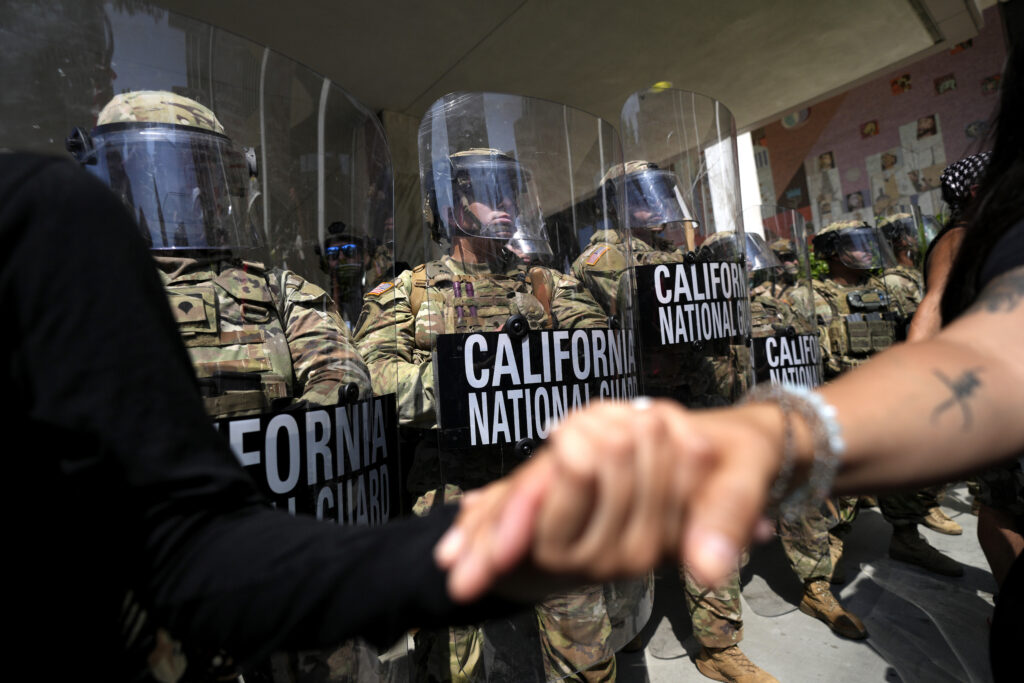Appeals Court Upholds Trump’s Control of California National Guard

A federal appeals court allowed President Donald Trump to keep using the California National Guard to respond to immigration protests in Los Angeles over the state’s objections.
A three-judge panel for the Ninth Circuit Court of Appeals unanimously ruled Thursday that District Judge Charles Breyer erred last week in issuing a temporary restraining order requiring Trump to return control of around 4,000 California National Guard troops to Gov. Gavin Newsom (D).
However, the panel rejected Trump administration lawyers’ assertions that courts cannot review a president’s decision to activate the National Guard.
The panel’s ruling only pertains to Breyer’s temporary restraining order, which was supposed to be in place for a limited period of time. The state now has the option to ask the full appeals court to rehear the matter, or it could appeal directly to the Supreme Court.
In a social media post, Trump called the ruling a victory “on the President’s core power to call in the National Guard!”
“The Judges obviously realized that Gavin Newscum is incompetent and ill prepared, but this is much bigger than Gavin, because all over the United States, if our Cities, and our people, need protection, we are the ones to give it to them should State and Local Police be unable, for whatever reason, to get the job done.”
Newsom in a statement said he was disappointed the panel did not uphold Breyer’s ruling but said it “rightly rejected Trump’s claim that he can do whatever he wants with the National Guard and not have to explain himself to a court.”
“The President is not a king and is not above the law,” the governor said. “We will press forward with our challenge to President Trump’s authoritarian use of U.S. military soldiers against citizens.”
Trump federalized the national guard through a broad order citing a rarely used statute that allows the president to mobilize the Guard when the country faces foreign invasion or rebellion or when the president is unable to execute laws with regular resources.
It marked the first time since 1965 that a president activated a state’s National Guard force without a request from that state’s governor.
In its lawsuit, California argued that recent protests over aggressive Immigration and Customs Enforcement immigration raids in Los Angeles couldn’t constitute a rebellion against the U.S. government, which Trump claimed.
The panel, composed of two Trump appointees and a former President Joe Biden appointee, rejected the state’s argument, saying conditions in Los Angeles were sufficient for use of the statute.
“We conclude that it is likely that the President lawfully exercised his statutory authority under [the statute], which authorizes federalization of the National Guard when ‘the President is unable with the regular forces to execute the laws of the United States.’”
The panel also rejected the state’s claim that Trump violated the statute because it specifies that orders issued under must be done “through the governors of the States.”
The judges said the Trump administration did issue orders “through” Newsom by directing them to the adjutant general of the California National Guard, who is authorized under California law to “issue all orders in the name of the Governor.”
The judges acknowledged that several issues in the case had not yet been resolved, including whether certain ways in which the Trump administration has been using military personnel in Los Angeles violate the Posse Comitatus Act. That law largely bars the federal government from using military personnel in civilian law enforcement under normal circumstances.
California and the Trump administration are set to return before Breyer later Friday for a hearing on a preliminary injunction. The hearing will likely include arguments on whether troops have violated the Posse Comitatus.